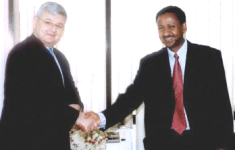Germany welcomes UN resolution on Darfur war crimes
BERLIN, April 1 (AFP) — The German government on Friday welcomed the adoption of a UN resolution to try war criminals from the conflict in Sudan’s violence-wracked western region of Darfur at the International Criminal Court.

|
|
German Foreign Minister Joschka Fischer (L) with his Sudanese counterpart Mustafa Ismail in Khartoum, July 12, 2004. (AFP) . |
The UN Security Council vote on Thursday paved the way for the Hague-based court to prosecute those behind the murder, rape and pillaging in Darfur region, where an estimated 300,000 have died in two years of violence.
German Foreign Minister Joschka Fischer said in a statement that the decision was “not only an important step towards ending impunity in Darfur”, it was also “a milestone in the development of this institution and human rights in general”.
The UN decision was hailed as a “historic precedent” by the Brussels-based International Federation for Human Rights (IFDH), but the umbrella body for organisations in many parts of the world deplored “shameful bargaining” that preceded agreement within the Security Council.
The resolution was only passed after weeks of deadlock over US opposition to the tribunal.
“The FIDH welcomes the historic precedent in which the UN Security Council has taken a case to the ICC,” said a statement signed by the federation’s president Sidiki Kaba, describing it as a key step towards “justice at last being rendered to millions of victims of crimes against humanity and war crimes committed in Darfur.”
Germany’s Fischer praised the “constructive cooperation of the United States” in the matter and also hailed France and Britain, which helped to engineer the breakthrough.
The FIDH statement, released in The Hague, however said that the move at the United Nations in New York, where the Security Council passed the resolution by 11 votes out of 15, was “to guarantee the impunity of American citizens and satisfy the United States’s paranoiac defiance of the ICC”.
The conflict in Darfur erupted when rebels in the western region rose up against the government in February 2003, a rebellion the government put down with the help of proxy local Arab militias known as Janjaweed.
Sudan has insisted it is attempting to stop the violence, though UN reports have said its efforts are insufficient and the Janjaweed have been accused of “genocide” against the local population of black African origin by rights organisations and the US administration.
The ICC, the world’s first permanent tribunal on war crimes and crimes against humanity, began work in the July 2002 under a Rome treaty ratified today by 98 states. However, its existence, which is not dependent on the United Nations, is strongly opposed by Washington because of hostility there to a permanent court as opposed to ad hoc tribunals.
The court is entitled to probe and try crimes committed on the territory of signatory states or by their citizens, but the United States has campaigned to persuade countries to sign what is known as an Article 98 deal, to protect US nationals on their soil from ICC investigation.
Both the first enquiries previously taken in hand by the court concern Africa: one is war crimes committed in the vast Democratic Republic of Congo, the other crimes committed during a long conflict in the north of neighbouring Uganda.
